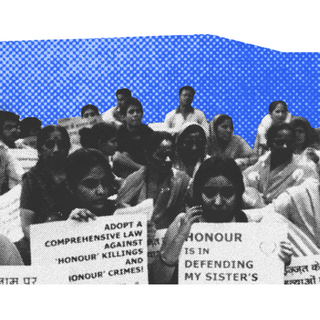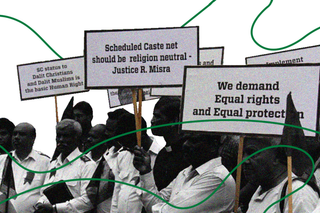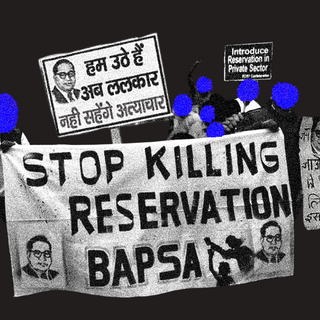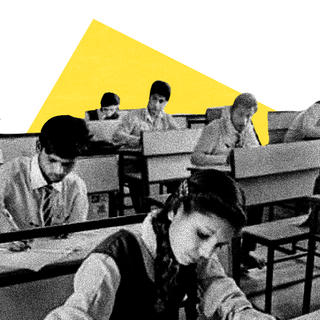
Govt Panel to Look Into Socio‑Economic Conditions of Dalit Muslims, Christians
Following several petitions to look into caste hierarchies across religions, the move highlights the ubiquity of caste in South Asia.

The Union Government proposed to institute a national commission to look into the social, economic, and educational status ofDalit communities that converted into religions other than Buddhism, Sikhism or Hinduism, reported The Indian Express this morning. Presently, only people in these religions can avail themselves of caste-based reservations and other affirmative action policies. Dalit Muslims and Dalit Christians cannot, and aren’t classified as Scheduled Castes (SCs) — they thus remain invisibilized in the national discourse around religion and caste.
The move can thus potentially lead to far-reaching changes in how the state and the general population understand and extend affirmative action to disadvantaged communities. Moreover, it shows how caste follows individuals even across religions, such that its hierarchies are evident even in communities that promised to eradicate them.
The move follows a stream of discussions, protests, and legal petitions that highlight the pervasive existence of caste hierarchies in even religions believed to be egalitarian and casteless; and comes on the heels of political parties initiating outreach programs to cater to marginalized caste communities within these religions. The commission has reportedly earned approvals from the Ministry of Minority Affairs and the Department of Personnel Training; and the Ministries of Home Affairs, Law, Social Justice and Empowerment, and Finance are consulting on it.
Historically, a large part of those who converted to Islam and Christianity came from Dalit and Shudra castes in the Hindu fold, seeking an escape from their persecution and possible emancipation. However, contrary to their expectations, most did not lose their caste status despite converting to religions that held promise of emancipation. As Surinder Kaur notes in her piece on Dalit Christians, “…conversion to Christianity has brought little change in their social or economic status.” Kaur notes that “To this day, Christians from different castes worship in different locations and bury their dead in separate graveyards” in some parts of the country.
Similarly, marginalized caste Muslims claim that there is a visible hierarchy in the socio-political and economic conditions of people within Islam. The plight of the vast majority of Indian Muslims who converted to Islam as Dalits or descended from already converted Dalit Muslims, remain starkly different to those of the small minority of ruling class Muslims who descended either from Muslim dynasties and Sultanates or from Brahmins, Kshatriyas, and other higher caste groups that interacted with these rulers in their courts and later converted to their religion. Ejaz Ali, the founder of the All India Backward Muslim Morcha, points out in an interview how “the traditional Muslim leadership has evinced little interest in the plight of the Dalit and Backward Caste Muslims” as it “wants to maintain its hegemony and control over the community.”
Related on The Swaddle:
All The Arguments You Need: to Advocate for Caste-Based Reservations
Shireen Azam, a researcher at Oxford studying caste among Muslims, cites a recent study on 7,000 Muslim households in Uttar Pradesh to note that despite Dalit Muslims comprising a significant number in the study (24% of all Muslims), “very few policy decisions take into account this section of the population which faces untouchability but (along with Dalit Christians) does not get any protection under the Scheduled Caste status.” Azam and co-author Goli further write that another study on Muslim “social spaces” in the country “notes that 70% of Muslim leaders belong to upper castes. Further, the composition hasn’t changed in the last 30 years.” These figures, and other writing by a steadily emerging set of marginalized caste voices among Muslims, indicate how caste has seeped into South Asian Islam as well.
Although the current commission, if instituted, will be the first to look specifically into the conditions of Dalit people who have converted to Islam, Christianity, and other faiths where reservations do not apply, earlier government reports have also highlighted how caste pervades these seemingly casteless and egalitarian religions in South Asia. In 2004, for instance, the Union Government set up a National Commission for Religious and Linguistic Minorities headed by Ranganath Mishra, a former Chief Justice of India. The Mishra Commission, which submitted its report in 2007, recommended that Scheduled Castes who converted to Islam or Christianity should be allowed to avail of reservation benefits, highlighting how these communities continue to face exclusion and untouchability even after changing their religion.
Dalit Muslims and Dalit Christians suffer doubly due to their minority religious status as well as their caste, and this needs to be recognized for introducing meaningful reform for these communities. The lack of representation of Dalit Muslim and Dalit Christian voices prevents acknowledgment of their discrimination and experience, which in turn has prevented the state from incorporating reform for these communities.
Amlan Sarkar is a staff writer at TheSwaddle. He writes about the intersection between pop culture and politics. You can reach him on Instagram @amlansarkr.
Related


All the Arguments You Need: to Advocate for Caste‑Based Reservations
